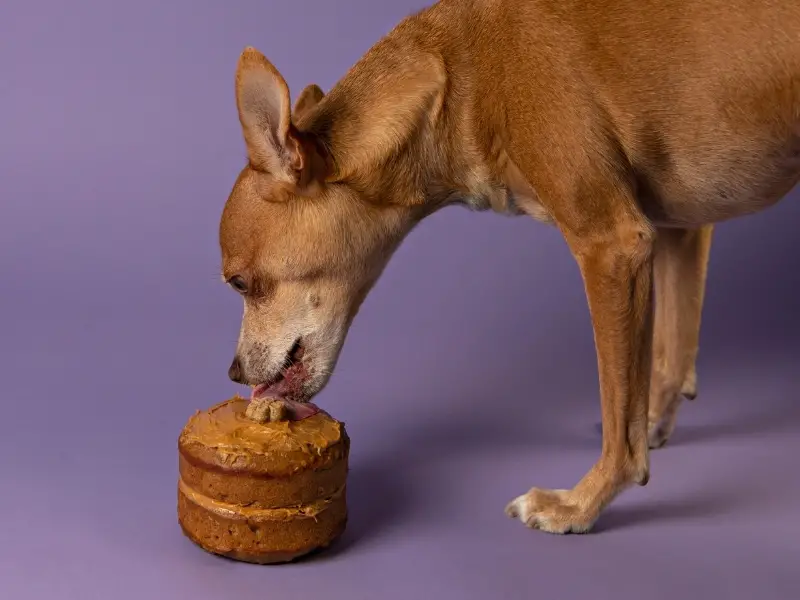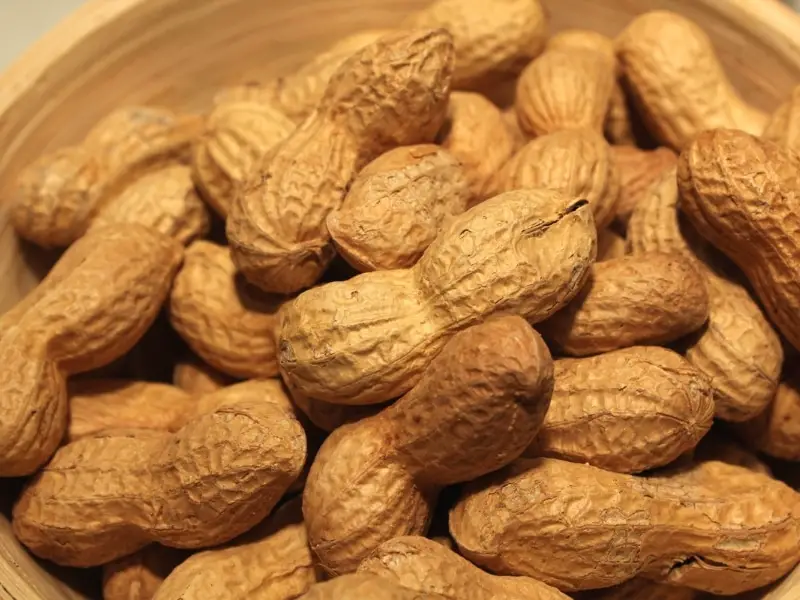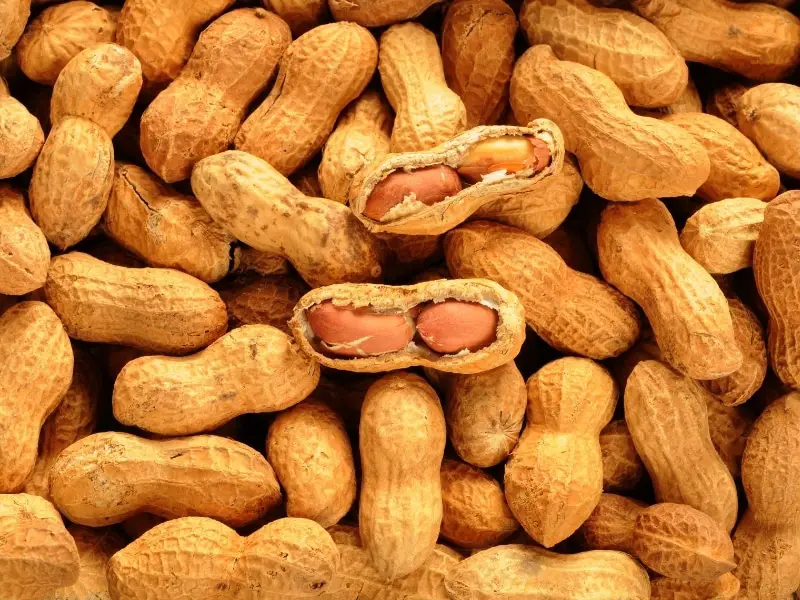Peanuts are an all-time favorite human snack, but dogs also go nuts for peanuts! If your dog hoovered several peanuts from the floor or you want to share some, you’re probably wondering are peanuts safe for dogs to eat.
So, can dogs eat peanuts? The short answer is yes; dogs can eat peanuts. Peanuts are full of protein, healthy fats, and vitamins B6, E, and niacin. However, only raw or dry-roasted unsalted peanuts are safe for dogs as long as you remove the shell. Don’t feed flavored and salted peanuts since they are harmful to dogs.
In this article, we’ll cover all the pros and cons of feeding peanuts and peanut butter to your dog. Keep on reading to find out everything you need to know!
Are Peanuts Good for Dogs?
Dogs can experience the same benefits eating peanuts as people. When consumed in moderation, peanuts can be a healthy and delicious treat for your canine companion.
Peanuts are a great source of protein, fiber, and fatty acids. They are also loaded with essential nutrients and contain vitamin B6, iron, magnesium, calcium, and potassium.
While peanuts and peanut butter can serve as a protein-rich and delicious snack, some types of peanuts are better for dogs than others. Dogs should only eat raw or dry-roasted unsalted peanuts since the salted and flavored kinds of peanuts are bad for their health.
Benefits of Peanuts for Dogs

Peanuts are safe for dogs to eat and are also loaded with valuable nutrients which can improve your dog’s overall health. Eating peanuts as an occasional treat can offer the following health benefits to your dog:
1. Strong Muscles
Peanuts are an excellent source of protein which helps build muscles and also serves as a valuable source of energy (source). Feeding peanuts as a dog treat is a great way to supplement your dog’s protein count and help them maintain lean and strong muscles.
2. Peanuts Improve Cognitive Function
Feeding your dog peanuts can improve their cognitive function and may even prevent and delay the onset of canine dementia. Peanuts are loaded with vitamin B6 which promotes brain health, improves mood, and may reduce the risk of heart disease.
3. Peanuts Can Keep Your Dog Energized
Peanuts are also an excellent source of magnesium which is involved in many functions within your dog’s body. One of its many roles is that it’s necessary for energy production on a cellular level, thus helping your dog to stay energized throughout the day.
4. Peanuts Can Prevent Anemia
Feeding your dog peanut butter or peanuts as treats is a great way to prevent anemia. Peanuts are rich in iron, an essential mineral that performs several functions including carrying oxygen in hemoglobin and is crucial for the formation of red blood cells.
Side Effect of Peanuts for Dogs

There is no doubt that peanuts can be a healthy treat for dogs, but there are some risks associated with feeding peanuts and peanut butter to your pooch. Potential side effects of peanuts are:
1. Choking Hazard
Since they are small and hard for dogs to chew, peanuts present a potential choking hazard, especially for small dogs. The risk of choking is even higher if your dog gulps an entire peanut with a shell.
Peanuts shells are also difficult to digest and can cause an intestinal blockage and severe digestive upset.
2. Pancreatitis
Peanuts are naturally high in fat which isn’t problematic when consumed in appropriate amounts. However, too much fat over a longer period of time can cause pancreatitis which is a serious and potentially fatal condition (source).
To avoid overwhelming your dog’s pancreas with fat, only feed moderate amounts of peanuts once in a while, as a super special treat.
3 Toxicity
While plain roasted peanuts and peanut butter are completely safe for dogs, the added salt and flavoring can be toxic to dogs. Ingesting large amounts of salted peanuts can lead to sodium ion toxicity in dogs, so it is best to avoid salted peanuts altogether.
Artificial sweeteners added to peanuts and peanut butter can also be extremely harmful to dogs. Commercial peanut butters often contain xylitol, a sugar substitute that is highly toxic to dogs.
Even a small amount of xylitol can lead to collapsing and seizures brought by a sudden drop in your dog’s blood sugar levels (source). If you plan on feeding commercial peanut butter to your dog check the ingredients carefully and make sure that there is no xylitol, which can also be labeled as “sugar alcohol”.
4. Allergic Reaction
Like people, dogs can develop an allergic reaction from eating peanuts. Depending on an individual case, the symptoms of peanut allergy can range from mild to severe.
If you notice that your dog is experiencing any signs of an allergic reaction such as sneezing, coughing, hives, swelling, or difficulty breathing, call your vet right away. Some dogs can even go into anaphylactic shock which is a potentially life-threatening allergic reaction.
What Kind of Peanuts Can You Feed Your Dog?
As mentioned earlier, dry-roasted or raw unsalted peanuts are the best and the only kind of peanuts that is safe for dogs to eat. Also, don’t forget to remove peanut shells before feeding peanuts to your dog to avoid the risk of choking and intestinal blockage.
How Many Peanuts Can a Dog Eat?
Let your dog eat only a few peanuts in one sitting and don’t feed peanuts as a daily treat. Eating larger amounts of peanuts regularly can be unhealthy for your dog and lead to pancreatitis and obesity.
As always, talk with your vet before feeding any type of people food to your dog. Your vet will tell you whether or not you should feed peanuts to your pooch based on their individual nutritional needs, age, size, and overall health.
How to Feed Peanuts to Your Dog?
Make sure the peanuts you are giving to your dog are free of salt and any type of flavoring. To avoid risks associated with feeding peanuts to dogs only offer raw, boiled, or roasted peanuts that had the shells removed.
Popular ways to feed peanuts to dogs are:
- Feed one peanut at a time as a tasty treat
- Make homemade peanut butter and use it as a treat
- Mix a small amount of peanut butter with your dog’s pet food
- Stuff a Kong toy with peanut butter as a fun treat
Conclusion
Peanuts can be an extremely healthy and tasty treat for dogs when offered in small amounts and only once in a while. Raw, dry-roasted, and boiled unsalted peanuts are safe for dogs to eat as long as you remove the shells before feeding them to your dog.
Don’t forget, salted and flavored peanuts and commercial peanut butter contain artificial additives that can be dangerous for your dog’s health. If you decide to feed peanuts to your dog, limit the amount to only a few peanuts, and don’t feed them to your dog every day.
Related Articles:


0 Comments